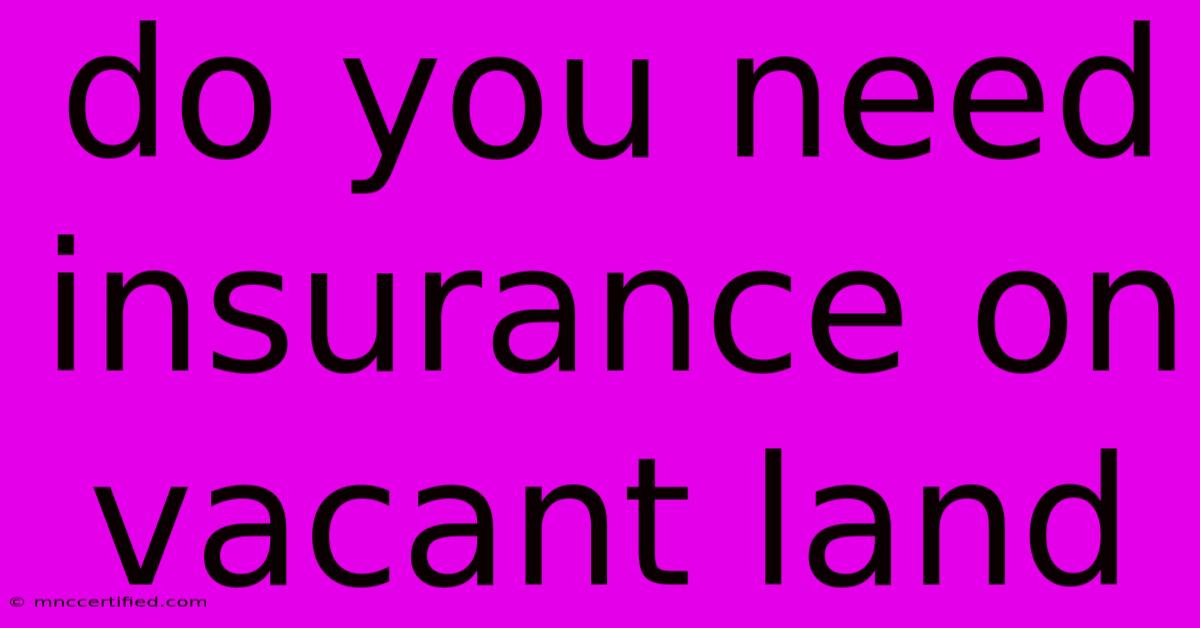Do You Need Insurance On Vacant Land

Table of Contents
Do You Need Insurance on Vacant Land?
Owning vacant land can be a great investment, but it also comes with its own set of risks. One crucial consideration is whether you need insurance. The answer? It depends.
Why You Might Need Vacant Land Insurance:
While vacant land may seem like an empty canvas, it's still vulnerable to several potential issues. Here's why insurance might be essential:
- Liability: Even if your land is undeveloped, someone could get injured on it. Think about trespassers, wandering animals, or even a fallen tree from a neighbor's property. Liability insurance can protect you financially if you're sued for damages.
- Natural Disasters: Flooding, wildfires, or storms can cause significant damage to vacant land, impacting its value and potentially leaving you with hefty cleanup costs. Natural disaster coverage can help alleviate these expenses.
- Environmental Concerns: If your land contains hazardous materials or faces environmental risks, you might need specialized insurance to cover potential clean-up or liability issues.
- Theft and Vandalism: Vacant land can be a target for theft and vandalism. Insurance can cover damages from stolen equipment, vandalized fences, or other property on the land.
Factors Determining Your Need for Insurance:
Several factors come into play when deciding whether or not you need insurance for your vacant land:
- Location: A property in a high-risk area for natural disasters, crime, or environmental hazards requires more serious consideration for insurance.
- Intended Use: If you plan to develop the land in the future, insurance can protect your investment during the construction phase.
- Value of the Land: If your land is valuable, even if it's just for its potential, it's worth investing in insurance to protect your financial stake.
- Personal Risk Tolerance: Some owners are comfortable taking on more risk, while others prefer the security of insurance. Consider your own risk tolerance and financial situation.
Types of Vacant Land Insurance:
- Liability Insurance: Covers your financial responsibility if someone gets injured on your property.
- Property Insurance: Protects against damage from natural disasters, theft, vandalism, and other perils.
- Environmental Insurance: Covers clean-up costs and liability related to hazardous materials or environmental concerns.
- Title Insurance: Protects your ownership rights and ensures the property is free from liens or encumbrances.
Consult With a Professional:
The best way to determine if you need vacant land insurance is to consult with an insurance broker specializing in this area. They can assess your specific needs and risks and recommend the right type and amount of coverage for your situation.
Conclusion:
Vacant land insurance is not a one-size-fits-all solution. By understanding the potential risks and considering factors like location, intended use, and value, you can make an informed decision about whether or not insurance is right for your property. Remember, investing in insurance can help you protect your investment and ensure peace of mind.

Thank you for visiting our website wich cover about Do You Need Insurance On Vacant Land. We hope the information provided has been useful to you. Feel free to contact us if you have any questions or need further assistance. See you next time and dont miss to bookmark.
Featured Posts
-
Celtics Beat Bucks 3 Key Takeaways
Nov 11, 2024
-
Social Media Screening For Insurance
Nov 11, 2024
-
Week 10 Inactives Eagles Vs Cowboys
Nov 11, 2024
-
Mowbrays Heartfelt Thanks To Sunderland Fans
Nov 11, 2024
-
A Better Insurance Agency Framingham
Nov 11, 2024